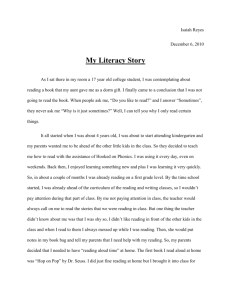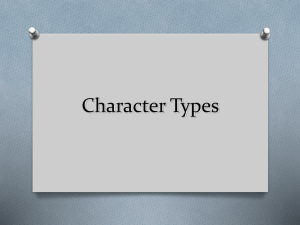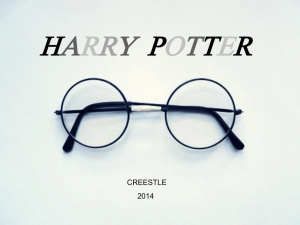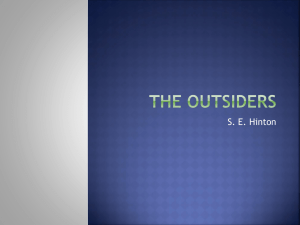Harry Potter's Symbolic Death and Resurrection
advertisement
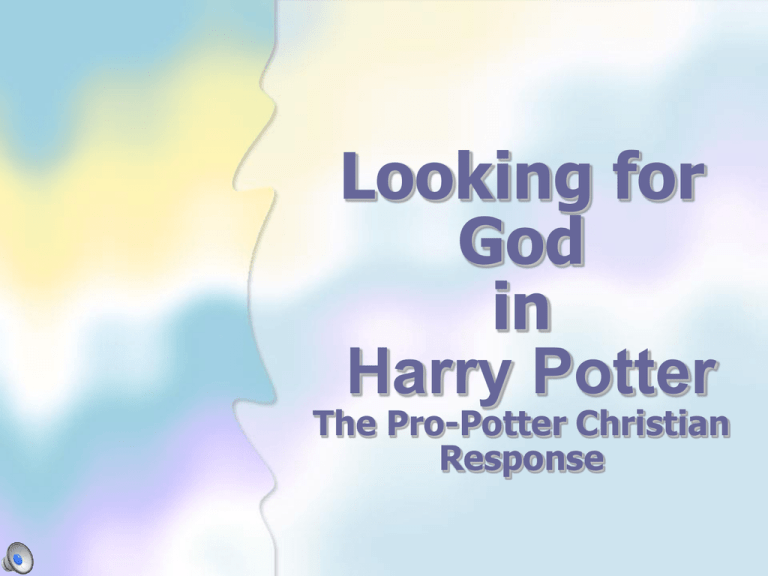
Looking for God in Harry Potter The Pro-Potter Christian Response Harry Potter as a Christian Story? • Argument #1: The Potter books illustrate a Christian worldview and fill our human need for stories about the fulfillment to be found in Christ. • Argument #2: The books portray Christian values and ethical teachings • Argument #3 The books are appropriate for everyone, Christian and non-Christian alike, young and old, and will lead some people to find Christ. The Greatest Story Ever Told…? • “Christians, of all people, should be celebrating the Harry Potter books and the attendant Potter-mania…my thesis is essentially this: As images of God designed for life in Christ, all humans naturally resonate with stories that reflect the greatest story ever told - the story of God who became man. The Harry Potter novels, the best selling books in publishing history, touch our hearts because they contain themes, imagery and engaging stories that echo the Great Story we are wired to receive and respond to.” (pp. Xviii-xix) Potter magic as Christian magic? •“Despite initially having forbidden my children from reading the Rowling books, reading them myself has convinced me that the magic in Harry Potter is no more likely to encourage real-life witchcraft than time travel in science fiction novels encourages readers to seek passage to previous centuries. Loving families have much to celebrate in these stories and little, if anything, to fear.” (p. 5) • Invocational magic - calling in spirit forces for power and control (bad) vs Incantational magic - literally, to harmonize, to imitate the power of God’s word to create (good). Magic in Harry Potter is entirely incantational. Muggles as metaphor? • The overlap between “reality” (world of muggles) and fantasy (world of wizards), far from confusing children, is in the tradition of the best Christian fantasy novels (Narnia, LOTR…) • “I don’t want to belabor this point, but C.S. Lewis described the life of Christians as a life spent “in an enemy occupied country.”…The magical and secret world inside Muggledom is not cause for concern so much as it is a parallel to celebrate… her secret world within our world coincides with rather than contradicts the worldview of Christians.” (pp. 7-8) The Symbolic importance of Harry Potter Body Ron Spirit Harry Mind Hermione The Symbolic importance of Harry Potter • Fantastic Beasts and where to find them… the Christian symbolism of: • Griffins (Griffindor, golden griffin) - Lion/Eagle, double nature = man/god of Christ • Unicorn - medieval symbol of Christ • Phoenix - (Fawkes) - “resurrection bird” - symbol of Christ, Christ’s sacrifice for us, and our hope of eternal life in Christ. • The Stag - Patronus symbol - symbol of resurrection in medieval times because antlers regrow - symbol of Christ • Centaur - symbol of man, symbol of Christ • Hippogriff - half griffin, half centaur - doublenatured again, symbol of Christ • Philosopher’s Stone - promise of eternal life and golden, incorruptible riches = promise of Christ • Red Lion - elixir of Life, from Philosopher’s stone, blood of Christ - red lion of Griffindor house = Christ QuickTime™ and a TIFF (Uncompressed) decompressor are needed to see this picture. Fun with names • • • • Albus Dumbledore - white, glorious, resplendent, and “bee” - (symbolic of the soul) Voldemort - flight of death, flight from death The Malfoys - Malfoy = “bad faith”, Lucius = Lucifer, Narcissa = self-centred, Draco = Dragon or serpent The Potters - Potter as metaphor for God (created mankind from clay - used repeatedly in OT and NT); also “pater” (father) in latin, is pronounced “potter”, James = brother of Jesus, Lily = symbol of resurrection, Harry = heir or herald - so Harry Potter = heir of God, son of God, or herald of God God’s Army vs the Servants of Satan? “The battle between Gryffindor and Slytherin is a battle between good and evil - I will even argue, believe it or not, that it is a reflection of the battle between those who serve Christ and those who serve the evil one. You may have read critics of the Potter books who assert that Harry’s world is morally ambiguous because the white hats need cleaning and the black hats demonstrate sufficient loyalty to one another not to be “jet black.” This is silly… Bad guys don’t do the wrong thing after struggling with a decision; they almost automatically do what most advances their individual or group advantage without regard for principle. Good guys often are tempted to do the wrong thing may even do the wrong thing- but they either choose the right or repent of their error in light of right and wrong This is exactly the situation between the Gryffindor white hats and Slytherin black hats. The Gryffindors… choose to do the right thing… though doing the right thing will probably mean their death. The Slytherins do the wrong thing without reservation or restraint.” (p. 16) Godrick Gryffindor (Sword, Sorting Hat) Albus Dumbledore (Fawkes, Order of Phoenix) James Potter (Lily, Sirius, Remus) Harry (Ron & Hermione) vs Draco (Crabbe & Goyle) Lucius Malfoy (Crabbe & Goyle) Lord Voldemort (Nagini & Death Eaters) Salazar Slytherin (Basilisk & Chamber of Secrets) Harry Potter’s Christ-like Journey • • • • • • Born of special parentage Raised in obscurity Learns truth of heritage Makes a choice - chooses “good” over “evil,” even when his own death seems inevitable. Dies, and is resurrected. “The climax of Harry’s hero journey invariably turns out to be a strong image of the Christian hope: that death is followed by resurrection in Christ. The answer these stories offer to the ultimate human problem-death- is always love or a symbol of Love himself, Jesus Christ.” (p. 23) Harry Potter’s Symbolic Death and Resurrection QuickTime™ and a DV/DVCPRO - NTSC decompressor are needed to see this picture. • In Philosopher’s Stone: “[knowing] all was lost, and fell into blackness, down, down, down…” Harry Potter’s Symbolic Death and Resurrection QuickTime™ and a DV/DVCPRO - NTSC decompressor are needed to see this picture. • In Chamber of Secrets: “Harry slid down the wall. He gripped the fang that was spreading poison through his body and wrenched it out of his arm. But he knew it was too late. ‘You’re dead, Harry Potter,” said Riddle’s voice.” Harry Potter’s Symbolic Death and Resurrection QuickTime™ and a DV/DVCPRO - NTSC decompressor are needed to see this picture. • In Prisoner of Azkaban “A pair of strong, clammy hands suddenly attached themselves around Harry’s neck… His mother was screaming in his ears… She was going to be the last thing he ever heard…” Harry Potter’s Symbolic Death and Resurrection QuickTime™ and a DV/DVCPRO - NTSC decompressor are needed to see this picture. • • • In Goblet of Fire -death symbolism of the graveyard, blood sacrifice, torment by Voldemort. In Order of the Phoenix “And then Harry’s scar burst open. He knew he was dead: it was pain beyond imagining, pain past endurance.” In Half-Blood Prince, spell of paralysis and invisibility… Harry Potter’s Symbolic Death and Resurrection QuickTime™ and a DV/DVCPRO - NTSC decompressor are needed to see this picture. • “Please note that Harry never saves himself but is always saved by a symbol of Christ or by love…. In Sorcerer’s Stone, it is his mother’s sacrificial love…in Chamber of Secrets, it is Fawkes… in Prisoner of Azkaban, it is the white stag Patronus… in goblet of Fire, it is the Phoenix song; and in Order of the Phoenix, it is Harry’s love….That he rises after three days in Sorcerer’s Stone is another obvious reference to the Resurrection.” If Harry Potter is A Christian story, what will happen in the final book…? • “I do think that Harry’s death is a probable end for the series. There are seemingly endless references to Harry’s being decapitated in the books. Rowling has told interviewers that she thinks the ending of Dickens’s Tale of Two Cities has the finest single line written in English (‘It is a far, far better thing that I do’), and I am convinced that Harry has a fate much like that of Sydney Carton. Harry’s self-sacrifice (in love for his friends) and Neville’s consequent defeat of Voldemort, after all, have been foreshadowed in the ending of Sorcerer’s Stone. I have no substantive reason to say that Harry sacrificing himself to save the world (“love trumping death”) is the ending that “must” happen; it just makes sense to me. It jibes with what I think is becoming increasingly clear with each book: Harry’s adventures, if not allegories, are at least an Everyman morality story about our life in Christ. I expect the books’ finale will make this relatively obvious even to those who have persisted as long as they have in denying the Christian imagery and themes of the series.” (p. 181)




